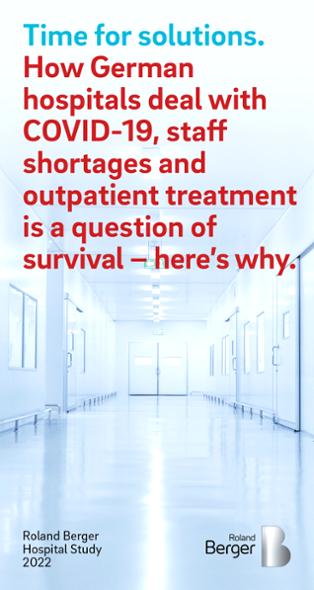The health sector is currently facing some challenges, especially from a financial perspective, which is why a digital transformation is necessary.


The pandemic and staff shortages have Germany's hospitals fighting for survival
As our latest hospital survey shows, nearly 70 percent of hospitals expect to run a deficit this year
The financial situation of German hospitals has worsened in recent months. Stagnating inpatient case numbers, the ending of COVID-19 compensation payments and revenue shortfalls due to staff shortages are causing growing deficits. Nine out of ten publicly run hospitals expect to make losses this year; across all operator types, the figure is just under 70 percent.

"The trend towards hospital privatization has been broken - the financial situation of the hospitals is now so bad that the private sector is refraining from takeovers."
As illustrated by the latest edition of the Hospital Study, our annual survey of the leaders of Germany's 600 largest hospitals, the situation is giving everyone cause for concern: An overwhelming 96 percent expect the financial situation to deteriorate in the next five years – by far the worst figure since the study series began. Even the compensation payments from the federal government, which were supposed to offset pandemic-related revenue losses and cost increases, have not provided much relief: For more than half of those surveyed, the payments barely covered the additional costs they incurred last year, and the gap is even bigger this year. As a result, just under 70 percent of all hospitals expect to post a deficit this year, with the figure as high as 90 percent for public hospitals.
From profit crisis to liquidity crisis
The reason for the poor financial performance this year are the various effects that are all hitting hospitals at the same time, making the impact particularly severe, such as the end of compensation payments from the federal government. Other developments like declining inpatient case numbers have been of concern to hospital leaders for some years now.
While all of this is going on, hospitals are suffering massively from COVID-19-related staff absences and ward closures. Many staff members, especially in nursing, have left the profession or are no longer available to the same extent as before after two years of taking on the huge additional workload. As a result, beds are often left empty because there are not enough nursing staff to meet minimum staff-to-patient ratios.

"COVID-19, shortage of skilled workers and outpatientisation are increasingly calling into question the continued existence of the German hospital landscape."
In addition, the rising inflation since spring 2022 is taking ever greater chunks out of hospital budgets because it is almost impossible to offset the cost increases in the short term. This is caused firstly by the rigid pricing as a result of the state-wide base rates and secondly by the DRG system, which is only adjusted for cost increases a long time after they occur. High collectively agreed pay rises, especially for doctors, place an additional burden on hospitals. The majority of respondents therefore expects their liquidity to decline further in the current year.
What consequences will this have for the German hospital market as a whole? Consolidation will continue to pick up momentum. One way of gearing up for the challenges of the future is to form inter-hospital alliances.
Staff shortages and outpatient treatment are seen as the biggest challenges coming down the line
In addition to the financial situation, hospital executives are increasingly concerned about staff shortages. In their view, the key topics for the next five years also include digitalization, outpatient treatment and the growing cost and efficiency pressures. Survey respondents are quite ambivalent over the trend of more and more patients being treated in outpatient rather than inpatient settings: almost 60 percent see outpatient treatment as both an opportunity and a risk, while only 12 percent perceive the development clearly as a risk. For three-quarters of respondents, the introduction of outpatient billing systems such as the planned hybrid DRGs will play a central role.
Watch our video and learn more about our study in detail with our Senior Partner Dr. Peter Magunia and Partner Janes Grotelueschen

Register now to download the full Hospital Study 2022 and learn more about the economic situation and growing deficits in German hospitals.







